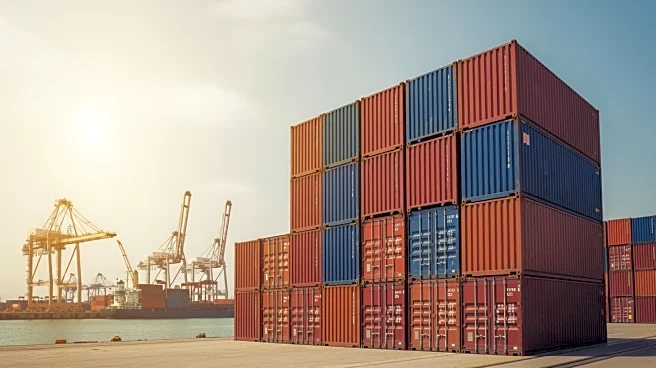What's Happening?
Maersk, a leading Danish shipping company, has increased its profit forecast for the year, citing resilience in global trade. The company reported preliminary earnings before interest, tax, depreciation, and amortization (EBITDA) of $2.68 billion for the third
quarter, surpassing analyst expectations of $2.6 billion. Despite a decrease from $4.8 billion in the same period last year, Maersk's CEO Vincent Clerc highlighted the company's ability to manage costs and maintain margins amid inflationary pressures. The company has revised its full-year operating profit forecast to between $9 billion and $9.5 billion, up from the previous guidance of $8 billion to $9.5 billion. Maersk also anticipates a 4% growth in global container market volumes for 2025, an increase from its earlier forecast of 2% to 4%.
Why It's Important?
Maersk's revised profit outlook is significant as it reflects the resilience of global trade, particularly in the face of economic uncertainties and inflationary pressures. The company's performance is often seen as a barometer for global trade, and its positive outlook suggests a continued integration of economies worldwide. This development is crucial for stakeholders in the shipping and logistics industry, as well as for global manufacturers, particularly in China, which remains a key driver of trade growth. The ability to manage costs and maintain margins despite challenges indicates a robust operational strategy that could influence industry standards.
What's Next?
Maersk's outlook suggests potential growth in global trade volumes, which could lead to increased demand for shipping services. This may prompt other companies in the industry to reassess their strategies and forecasts. Additionally, the resilience in demand across geographies, including the U.S., as the year-end peak approaches, could lead to further adjustments in operational strategies to capitalize on this trend. Stakeholders will likely monitor Maersk's performance closely to gauge the broader implications for global trade and economic integration.
Beyond the Headlines
The resilience of global trade, as indicated by Maersk's performance, challenges narratives about the decline of globalization. The continued strength of manufacturing, particularly in China, underscores the interconnectedness of economies and the importance of maintaining robust trade relations. This development may influence policy discussions on trade agreements and economic partnerships, highlighting the need for adaptive strategies in a dynamic global market.
















